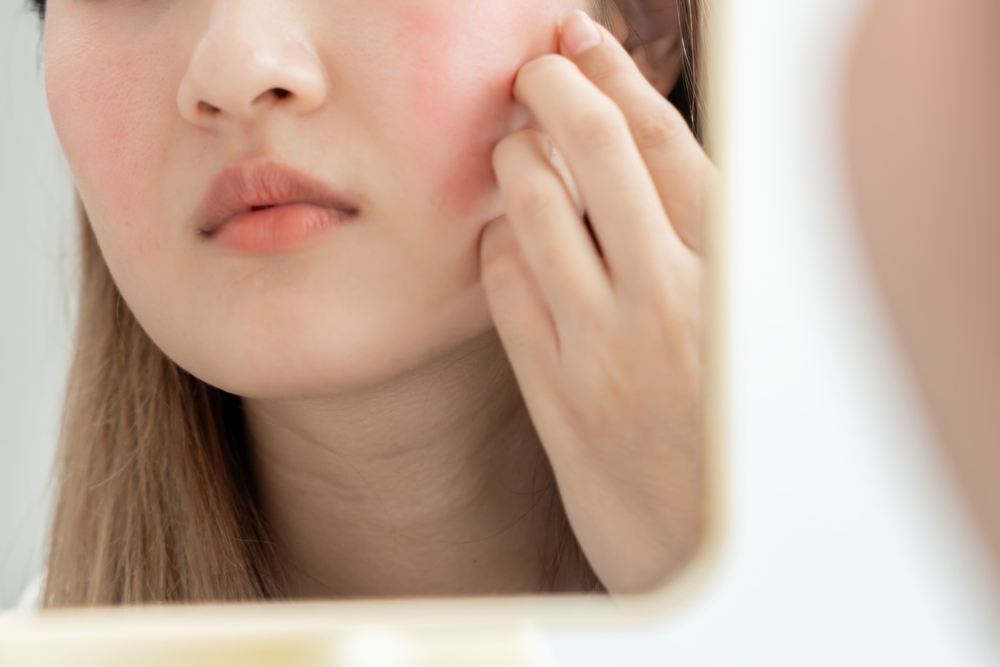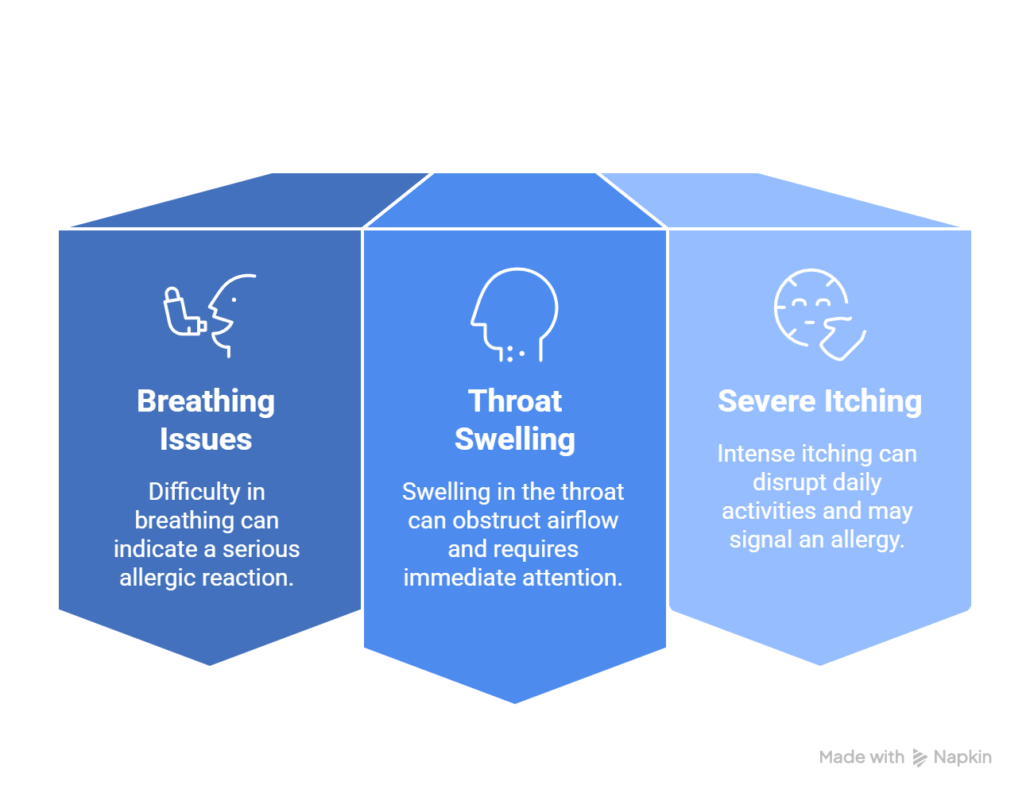A drug allergy rash can be an uncomfortable and sometimes confusing reaction, with symptoms that vary in how long they last. In many cases, these rashes may clear up in a few days, while others might take a week or longer, depending on the type of allergy and individual response.
At Penn Medicine Becker ENT & Allergy, our experts apply their extensive expertise to help patients navigate through the complexities of drug allergies. Knowing when to seek medical help and implementing strategies to prevent recurrence is pivotal in managing these allergic reactions and ensuring patient safety and comfort.

What to Expect with a Drug Allergy Rash
- A drug allergy rash can last a few hours to several days, depending on the reaction type.
- Immediate drug allergy rashes often fade within one to three days after stopping the medication.
- Delayed drug allergy rashes may last longer, sometimes up to two weeks or more.
- Treating a drug allergy rash early with doctor-recommended care can shorten how long it lasts.
- If a drug allergy rash gets worse or comes with other symptoms, seek medical help right away.
Duration of Immediate Drug Allergy Rashes
Fast and Intense
An immediate allergic reaction to drugs can trigger skin issues such as itching, redness, and hives, typically within minutes to hours after taking medications. This happens because the body identifies the drug as a harmful substance and starts an immune response.
If you have an allergic reaction to a medication, stop taking the drug and consult a healthcare provider right away. Early assessment can help in preventing more serious health problems. A drug rash usually clears up when the offending medication is stopped and treated properly.
The timeline of a drug-induced skin reaction is quick:
It’s important to note these times of reaction and get advice from a healthcare provider to properly manage the condition.
Duration of Delayed Drug Allergy Rashes
Slower to Show, Slower to Fade
A delayed allergic reaction to medicine indicates that the body’s immune system has flagged the drug as harmful. This type of response often appears not immediately but after hours or days when white blood cells target the medicine. A rash is a typical sign that appears and can persist for various durations.
These rashes usually develop a few days after beginning the medication and may last for several days even after discontinuing the drug. Systemic symptoms might also present alongside the rash, making it crucial to seek care from a healthcare provider.
They will assess the severity of the allergic reaction and give advice on the best treatment plan. This allows individuals to make knowledgeable decisions about managing their condition and avoiding the medicine that caused the issue.
Get Relief And Answers For Your Drug Allergy Rash
Our Specialists Are Here To Help You Feel Better, Faster—Starting With The Right Diagnosis.
Factors Impacting Drug Allergy Rash Duration
The duration of a drug allergy rash can vary widely from person to person. Several key factors influence how long the rash may last:

How Is a Drug Allergy Rash Diagnosed and Timed?
Identifying a drug allergy begins with a healthcare provider reviewing the patient’s medical history and symptoms such as skin rashes, breathing issues, or itching. Medical tests like blood and skin tests are often necessary to pinpoint the exact cause of the allergic reaction.
After an allergy is confirmed, the provider can estimate the rash’s likely duration. Drug allergy rashes typically subside once the medication is discontinued. A healthcare provider is skilled in managing these allergies and will offer treatment to relieve symptoms and aid recovery, closely monitoring the reaction until the rash improves.

The approach to managing a drug allergy includes:
Swift action and informed handling of the condition contribute to a positive outcome.
Effective Management and Treatment to Minimize Drug Allergy Rash Duration
Managing a drug allergy requires prompt and appropriate action. Once symptoms like skin rashes occur, the goal is to stop the reaction and reduce discomfort. Here are strategies to treat a drug allergy and decrease the severity of skin rashes:
If a drug allergy rash is paired with trouble breathing or throat swelling, seek emergency medical help. This could be a sign of a severe reaction, like anaphylaxis, which needs urgent care services.
Regular check-ups with your healthcare provider are crucial to monitor your skin and general health recovery. They might also suggest alternative medications that won’t cause an allergic response.
By acting quickly and using effective treatments, the duration of a drug allergy rash can generally be greatly decreased, providing relief and reassurance.
Understand What’s Causing Your Rash And How Long It Will Last
You don’t have to guess—let our experts guide you to the answers and relief you need.
When to Seek Medical Help for a Drug Allergy Rash
If you develop a skin rash due to drugs, it’s important to act quickly. Immediate medical attention should be sought if you experience:
- Trouble with breathing
- Throat swelling
- Severe itching affecting normal activities
At such times, contact a healthcare provider without delay. Early intervention is key to managing these symptoms effectively and can prevent severe complications. Inform your healthcare team at once if you’re taking any new medications, as this is important for your care.

Strategies to Prevent Prolonged Drug Allergy Rashes
To prevent prolonged drug allergy rashes, it’s important to take steps that reduce immune response and ensure overall health. Here’s what you can do:
- Identify known allergens: Work with a healthcare provider to determine substances that cause allergic reactions. Then, avoid these medications.
- Listen to your body: Stop taking a medicine at the first sign of an adverse reaction and inform your healthcare provider about any unusual skin reactions.
- Choose alternatives: If a medicine induces an allergy, find another that won’t cause a skin reaction.
- Monitor reactions to medications: Pay attention to how your body responds to new medications to catch allergic reactions early.
- Inform healthcare providers of your allergies: Make sure all healthcare providers know about your medication allergies to prevent inadvertent exposure.
By applying these measures, individuals can distance themselves from allergens and safeguard their skin and body. This can help reduce the impact and length of drug allergy rashes.
How to Avoid Drug Allergy Rash Coming Back
Living with a drug allergy involves being cautious and proactive to avoid rashes. If you’ve experienced an allergic reaction with symptoms like itching, consider these actions to help prevent future issues:
- Inform your healthcare provider about your allergy for your medical records.
- Learn the early signs of an adverse reaction, including itching or systemic symptoms.
- Collaborate with your healthcare provider on a treatment plan for managing rash occurrences.
Monitoring your body and blood for allergy indications is critical. This helps in avoiding allergens and lessening the risk of enduring distressing symptoms.
Understanding the duration of a drug allergy rash is crucial in navigating this health challenge. If you or someone you know is dealing with a drug allergy rash, it’s important not to navigate these waters alone. Seeking expert guidance can help in accurately diagnosing the condition, estimating the duration, and receiving the most effective treatment to minimize discomfort.
Should you have any concerns about a drug allergy rash or wish to learn more about management and prevention strategies, schedule a consultation with Penn Medicine Becker ENT & Allergy. Our expertise is invaluable in providing the support and advice necessary for dealing with drug allergy rashes and ensuring your health and well-being.

